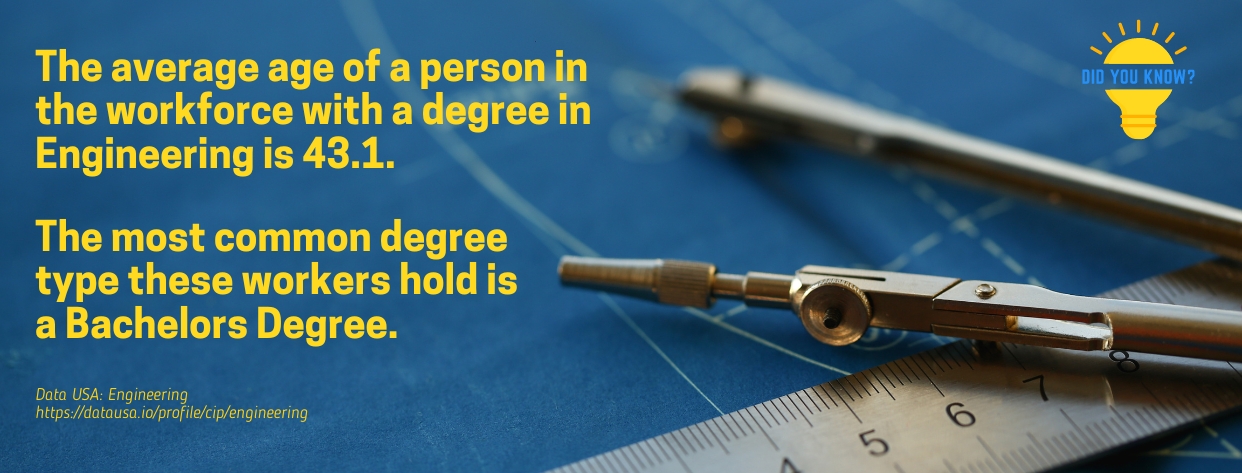Find Your Perfect School
Engineering, which essentially uses analytical and critical thinking skills to solve complex problems, involves not only construction work. Other types of engineering include software engineering, computer engineering, chemical engineering, and mechanical engineering, to name a few.
Engineering is the application of science to provide solutions to various industries, such as transport, entertainment, space, medicine, and the environment. Combined with technology, engineering has paved the way for different industries to improve.
Valuable Info: The Most Lucrative Engineering Jobs
Why Engineering Degree Holders Consider Career Changes
However, no matter how much you earn in your engineering career, you may feel stressed or pressured, making you feel exhausted and ready for a career switch.
Industry experts believe that the following are some of the major reasons people quit engineering jobs and opt for a career change:
Poor management
Just like any other profession, engineering jobs may mean having to deal with bad bosses. This is especially frustrating because engineers need clear direction and guidance to complete their projects effectively.
One example of poor management is when a manager or superior fails to communicate effectively with their engineering team, leading to confusion, costly mistakes, and wasted time and resources.
Micromanagement or overly controlling an engineering team is also one of the major reasons engineers leave their jobs. Although they need guidance, engineers must work independently to perform efficiently and realize their full potential.
A boss with unrealistic expectations or timelines can also cause burnout among their engineers. This can result in subpar work, leading to costly damages, further frustrations, and engineers looking for other jobs in the long run.
Redundant or repetitive work
Engineers carry out repetitive tasks daily. These include testing and troubleshooting. This can make engineers feel monotonous and bored. Aside from that, a lack of variety may also make one feel limited, especially for those individuals who thrive on creativity and innovation.
Engineering work may also have limited social interactions, especially for those who only get to work in a smaller team. This can make one feel isolated and bored. As a result, some professionals may choose to use their practical experience elsewhere.
Lack of career growth
Software engineers leave a company thinking of changing careers because many feel engineering is a dead-end job. This is especially true if all senior positions have been filled within an organization. Also, being in the same position for years without any promotion can demotivate employees to seek a greener pasture elsewhere.
Companies need to have professional development programs in place to support their employees’ career goals. Engineers can feel demotivated if their efforts and hard work are not properly compensated through a promotion.
Not enough work flexibility
Work flexibility can be a huge deal-breaker nowadays. Even after the COVID-19 pandemic has ended, many people still want to have the option to work from home on some days. Aside from that, some engineers are looking for a work arrangement that allows them to pick their hours.
Flexibility is best for both employers and engineers. This is because it improves comfort and efficiency. It also accommodates emergencies, such as family illness, special events, or doctor’s appointments. Plus, it allows changes in the schedule without reducing the hours or income.
Undesirable work environment
A study conducted by the Harvard Business Review revealed that women who study engineering leave their jobs because of gender stereotyping. While still in school, women were assigned more manageable tasks, such as collecting equipment, coordinating, writing down notes, and sorting papers. At the same time, men were made to solve problems that developed their technical and analytical skills.
In the workplace, some women complain about older male engineers who try to harass them. This kept female interns doing desk jobs, like shuffling papers, while male counterparts were given actual engineering assignments. As a result, female engineering graduates are forced to revisit their career goals.
Check this out: Great Career Changes for Accountants
Top Options for Career Changes for Engineers
With so many openings on the job market nowadays and considering engineers’ transferable skills, it won’t be hard for these professionals to switch careers! Whether you’re a civil engineering graduate, a software engineer, or with a chemical engineering background, you’ll find these alternative options for your career transition ideal.
Project Manager
Engineers can be the best people to perform project management because of their technical acumen, which is necessary to oversee complex projects.
The following skills are crucial for you to understand the technical aspects of project management, allowing you to make informed decisions and communicate effectively with your team:
- Problem-solving – engineers as project managers must be able to address various problems and suggest actionable solutions to ensure the project gets back on track.
- Organization – you will oversee and manage activities, such as operations, production, testing, and quality assurance.
- Strategic planning – you must have a detail-oriented way of thinking to develop concepts for a project and design new products.
- Communication – project managers must have effective communication and people skills to encourage collaboration and ensure the project is finished on time.
As a project manager, your responsibilities include the following:
- creating detailed project plans
- proposing budgets
- providing equipment needs
- preparing, coordinating, and monitoring assigned projects
- ensuring compliance with applicable codes, QA/QC policies, practices, specifications, and performance standards
- communicating and interpreting clients’ needs and requirements
To be a project manager, you must have an active engineer license, leadership, and time management skills.
Patent Attorney
Another ideal option for engineers or engineering graduates looking to transition careers is to be a patent attorney. Many patent attorneys have an engineering degree or related field.
What makes engineers great patent attorneys is their strong technical background, allowing them to understand the intricacies of an invention easily. They can efficiently and effectively navigate the patent to help protect intellectual properties.
They also provide valuable insights and guidance on the following:
- licensing agreements
- joint ventures
- patentability assessments
- patent strategies
- intellectual property law, including trade secrets, copyrights, and trademarks.
Becoming a patent attorney requires a law degree and passing the patent bar exam to have a license to practice law.
Data Scientist
Data science is an emerging field as more and more companies need data to make informed business decisions. Because of this, they are hiring people with computer science backgrounds and practical experiences.
Mechanical engineers, in particular, make the best candidates for the job because of their applicable skills in programming, math and statistics, domain knowledge, and visualization.
Data scientists are experts in extracting, analyzing, and preparing data to help stakeholders make informed decisions. You will also be responsible for finding new insights from the data designed by data engineers. You will conduct online experiments, develop hypotheses, and identify trends using your knowledge of machine learning algorithms, data analytics, and statistics.
Engineering Professor
Engineers passionate about working with students and teaching in a classroom can work as engineering professors. People interested in studying new materials and gaining valuable ideas would be more than happy to train students instead of working in their field.
Engineering professors find more satisfaction in being around bright and promising young people who are interested in becoming engineers in the future. The industries with the highest published employment of engineering teachers are colleges, universities, junior colleges, technical and trade schools, and professional schools.
The work of engineering faculty includes:
- prepare course materials, including handouts, homework assignments, and syllabi
- write grant proposals to receive funding for external research
- prepare and conduct lectures to undergraduates and graduate students about hydraulics, robotics, and mechanics
- keep yourself up-to-date with the developments in the field
- evaluate and grade students’ performance in school, including their papers, assignments, and laboratory work.
Technical Writer
Engineers are trained to apply their technical acumen and share their knowledge with others. However, to impart knowledge and personal experience, one must learn about technical writing.
Technical writing helps engineers present valuable information clearly and concisely. It can also lead to smoother business operations, better relationships with clients and stakeholders, and better employee training.
Technical writers are in demand by companies in the engineering industry for technical documentation to represent critical deliverables, such as a project engineering plan (PEP) or construction work package (CWP). Because people with a bachelor’s degree in engineering are skilled in analyzing and understanding technical information, they can translate it more efficiently to help companies secure funding, improve the overall work environment, and increase productivity.
Database Administrator
A database administrator is an IT professional in charge of handling the general management of a database. You will also oversee user accounts access issues, overall upkeep of database operations, and data integrity. Also, you will help troubleshoot problems in the database and look after the flow of tasks.
Other duties of a database administrator include the following:
- installation of database server equipment
- assessment of database storage requirements
- upgrade and update database software
- creation of user accounts
- implementation of database security policies
- management of user permissions and access
- maintenance of archived information
- backup of data recovery files
- generation of database reports
AI Specialist
The Artificial Intelligence (AI) job is one of the most in-demand jobs.
An AI specialist is a professional adept with the major AI platforms and technologies. They are also responsible for understanding data, identifying the problem, and providing solutions to address business opportunities.
An AI specialist job requires experts to:
- develop AI models and show stakeholders their unique benefits
- identify what employees need in terms of training through surveys, consultations, or interviews
- designing training manuals and online learning resources to teach employees about the proper way of using different AI models
- carry out administrative functions, like monitoring the cost of materials and setting up equipment and systems based on standards they created
- create and manage pre-existing AI systems
- conduct statistical analysis and write results that organizations can use to make informed decisions.
Marketing Automation Specialist
To be a marketing automation specialist, you need to be proficient in how a marketing automation system works, understand its impact on an organization, and understand the database.
As a marketing automation specialist, your work involves:
- sending sequence emails,
- sending emails at certain intervals,
- creating or modifying lead scoring rules to rate between cold and hot leads,
- sending trigger-based campaigns,
- mapping out plans using flowcharts,
- keeping an eye on databases and knowing the database, and
- creating or modifying target goals.
You will also use flowcharts to demonstrate the marketing automation process. More importantly, you will share the knowledge and help others understand what AI is all about.
Drone Pilot
Drones or unmanned aerial vehicles (UAVs) have become more in demand over recent years, which is why more drone pilots are needed.
There are different career paths for drone pilots:
- Self-employed – they are experienced in the field and operate their own business. Their work setup is more flexible but can come with greater risk.
- Freelance – you get to work for different companies on a project basis. You also have more freedom to set your own rates and schedules.
- Full-time – you work as part of a team and have consistent income as a full-time drone pilot.
As a drone pilot, you can help with unique projects, such as:
- Digital terrain modeling – you will be responsible for loading drones to collect photos and data for a digital terrain model (DTM). Engineers will then use the data collected to determine whether a project is viable on specific terrain and suggest any necessary adjustments.
- Structural analysis – you will circumnavigate a structure using a drone to reach hard-to-reach spots with little to less impact on surrounding areas, pedestrians, and traffic.
- Potentially hazardous site photography – you will carry out high-resolution photography and videography and conduct a DTM to prevent engineers from entering a potentially hazardous site.
- Material estimations – you will navigate drones to get a quantitative assessment of materials on a site to provide stakeholders with a verified and certified stockpile report.
Interior Designer
Interior design and civil engineering may be very different professions, but they have a few similarities. Both fields work to help clients create safe and functional spaces. Both disciplines take advantage of their knowledge in physics, geometry, and engineering principles to provide clients the opportunity to make their lives better by creating environments that are not only safe but also aesthetically appealing.
As an interior designer, your primary role is to:
- work with clients to identify or set their goals and requirements for the space they need,
- analyzed movement and use of patterns
- prepare visual aids to show the initial design to clients
- constantly communicate with clients to determine if they approve of the décor, furnishings, and other materials to be used
- estimate timelines and project costs and present them to clients
- obtain the necessary materials
- oversee the overall design and installation process
- ensure clients are satisfied upon the completion of the project
To be an interior designer, you must have strong visual design skills, practical communication skills, and a basic understanding of inspection regulations and building codes. You must also have a bachelor’s degree in Interior Design or a related field and an Interior Design Certification.
In Conclusion
When you’ve finally decided to pursue a new career path, you should carefully choose the profession you want to pursue.
First, you must know precisely what you want to achieve and what you are so passionate about. Second, think of the applicable skills and education. Finally, narrow your choices based on pay, schedule limitations, and location. It would also be ideal to complete an internship to have the opportunity to explore the job you are considering.
Once you feel entirely ready to take on a new role, search for available positions on job boards so you can start applying.
Before you go, check this out: The Best Bachelor’s in Liberal Arts and Humanities Careers





